Table of Contents
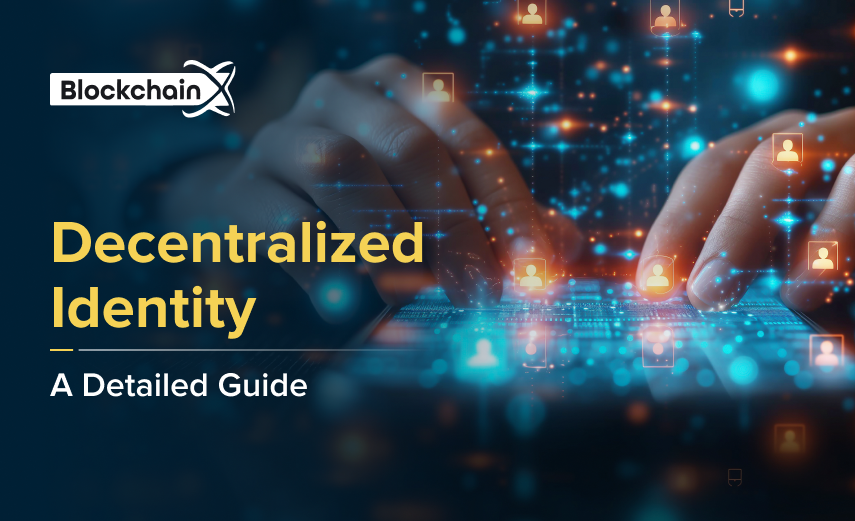

Decentralized Identity: A Detailed Guide for 2026
Listen to the Audio :
While web3 technology is creating wonders in all fields, the digital identity management sector is not far behind. Digital identity is decentralized using the fruitfulness of the blockchain and web3 development solutions, provide users with greater control over their digital personas and improved security.
The benefits of decentralized identity explained here, do not end. As Web2 focuses on multiple website usage or remembering multiple usernames and passwords for accessing identification information is completely removed by the decentralized identities.
Identity tools typically use a centralized approach to store, manage, and protect users' identities. But it uses blockchain and Web3 to eliminate reliance on third parties.
The world has shifted to digital transactions in all spheres of life from governance to commerce. Hence, digital identity tools are essential for enabling seamless access to various online services and applications. It is needed for digital identity management.
What is Decentralized Identities?
Decentralized identities based on a verifiable framework for identity management. It allows users to develop and maintain their own digital identity without relying on a third-party service provider. Decentralization of identity management systems emphasizes the flexibility to manage your identity without relying on a specific service provider.
Decentralized identification systems, also known as the ultimate identity ecosystem, serve as an effective approach followed by Internet users in interacting and managing data.
The fundamentals of decentralized identity is to create a decentralized way that can facilitate data usage and management. Decentralization helps remove time-consuming processes of identity verification through different organizations.
Why Do You Need A Decentralized Identity In Blockchain?
Everyone is searching for the reason why we need a decentralized identity. No matter how many safety measures there are, all of the users are worried that their data will leak in some way. We can see decentralized identity in blockchain as a relief from these kinds of security concerns. Let's understand the importance of these through the following points.
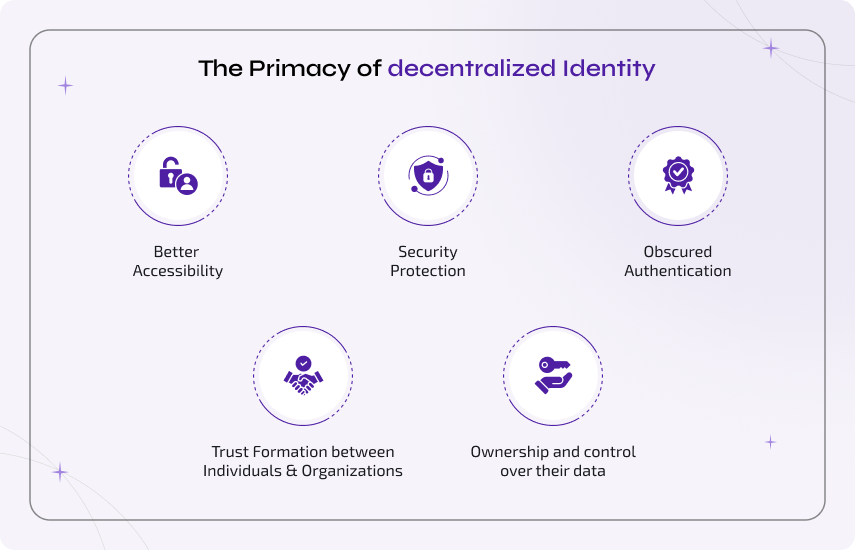

Better Accessibility:
No more need to remember multiple usernames and passwords to access digital services. Decentralized identity in blockchain, supported by blockchain development, eliminates the need to rely on a third-party service provider for digital identity.
Security Protection:
The collaboration between decentralized identity and blockchain serves extraordinary advantages like cryptographic security. Cryptography and blockchain make the digital identity data immutable, and unchangeable, thereby establishing safeguards against data tampering.
Obscured Authentication:
Web3 technology and decentralized projects provide a viable solution for using a single identity to access different digital services. These completely remove the concept of multiple username and password usage or multiple website usage that Web2 technology implies. And even the identifiers we keep as highly private identifiers make the identity management and authentication process more complex.
Trust Formation Between Individuals & Organizations:
The need for decentralized identity in digital identity management systems focuses on the beneficial side of improving privacy, validation, and ownership of individuals' private data. Organizations can use on-chain identity solutions to verify the authenticity of a specific user's digital identity without time-consuming processes and manage it effectively.
Ownership and Control Over Their Data:
Modern technology removes the interpretation of third-party control to avoid the complexity and risk behind traditional identity management systems. It helps maintain a user's ownership, thereby introducing precedents for self-ownership and control of their private data.
How do decentralized identities work?
Decentralized Identity works with the blockchain to give sovereign control over digital identities to users themselves. Blockchain digital identity solutions ensure that users control their digital identities without governments, big tech companies, or other commercial entities acting as intermediaries.
The role of decentralized identity in the financial sector is attracting new attention. In this sector, users have limited control over the security, sharing, and accessibility of their data through the interpretation of third-party agencies. Data in decentralized identifiers and verifiable credentials are completely indestructible or immutable, thereby removing control from centralized intermediaries.
To understand the detailed working mechanism of decentralized identity in digital identity management, the following key components of decentralized identity. These factors refer to the step-by-step process of action.
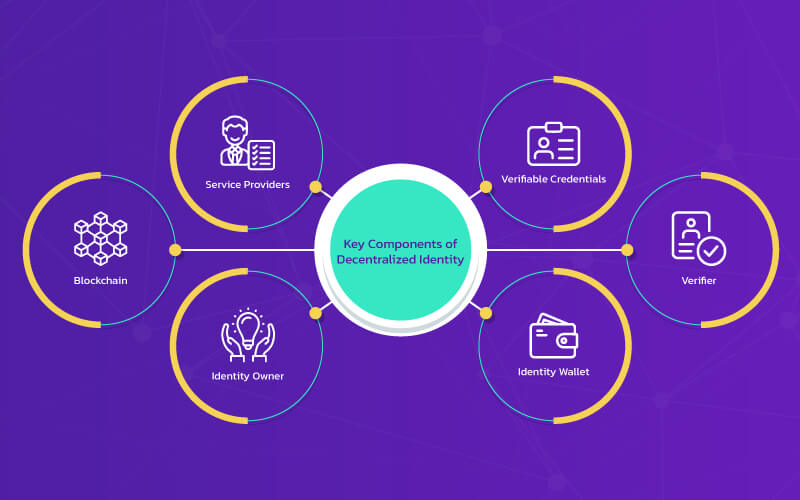
Blockchain:
Blockchain's distributed ledger helps store data with cryptographic security, making it impossible for anyone to change identity data. Blockchain development provides the mechanism and updated features for decentralized identifiers and functioning. The consensus mechanism behind blockchain ensures the verification of identity details before processing the storage and holding identity data on blocks.
Identity Wallet:
One of the key components of decentralized identity is identity wallets, an app that allows users to create their decentralized identity and control access to service providers. Identity wallets are designed as on-chain applications to provide convenient storage services for verifiable credentials.
Identity Owner:
The end users who create their decentralized identity using the identity wallet for the security of their private data.
Verifier:
Person providing and verifying identity information. Signing the transaction with their private key for approval.
Service Providers:
Another decentralized identity element, is an application that accepts authentication with decentralized identity access to the blockchain to look up the user's shared decentralized identifiers.
Verifiable credentials:
These are decentralized forms of certifications and other legal documents that you can store in your decentralized wallets for more security. The operation of verifiable credentials revolves around three distinct entities: holders, issuers, and verifiers.
Types of Decentralized Identity Solutions
The exponential development of decentralized finance in recent years has increased the need for digital identity systems to interact with Web3 technology and exchange credentials without providing sensitive personal information.
Non-custodial crypto wallets:
Users can transact without the need for any institution. Here users have full control over their private keys, which are used to verify transactions and prove ownership of a blockchain address.
Soulbound Tokens:
These are non-transferable types of NFTs. They can help represent a person's identity and accomplishments on the Web3.
Unstoppable Domains:
One more decentralized identifier is unstoppable domains that permit users to buy and mint Web3 domain names. And these are theirs to keep forever.
Proof of Humanity:
It is a decentralized social identity verification system and blockchain-based verification protocol and registry. Built on the Ethereum blockchain that allows users to create profiles and vouch for other persons they know.
Key Components of a Decentralized Identity System
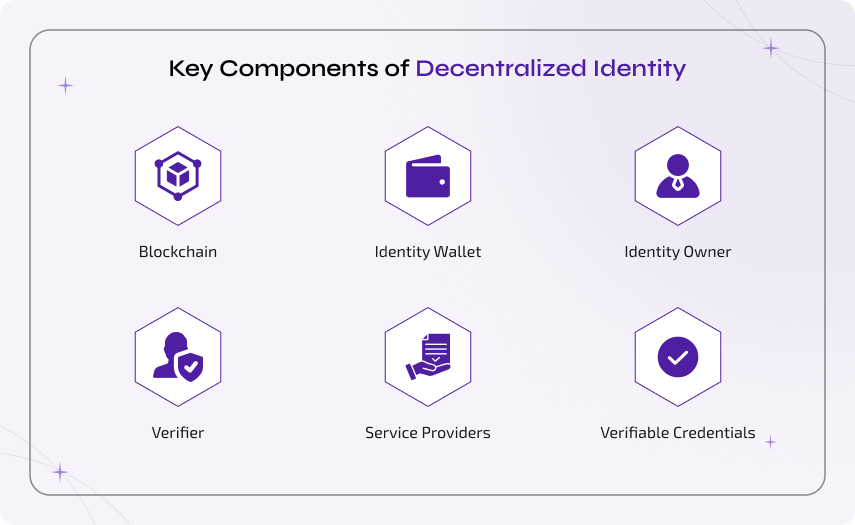

Decentralized Identifiers (DIDs)
The user, not a central authority, creates and manages DIDs which are unique, verified identifiers. They serve as the basis of a decentralized identity enabling secure platform-to-platform authentication without centralized databases.
Verified Credentials (VCs)
Verifiable credentials are digital attestations from reliable sources that validate claims about a person or organization (e.g., age, qualifications). Users can choose which credentials to share, protecting their privacy and data control.
Blockchain or Distributed Ledger
A decentralized ledger offers a tamper proof, secure & immutable framework for storing revocation registries, credential schemas and DID documents. It maintains trust without depending on a single central figure.
DID Document
A machine-readable file connected to a DID is called a DID Document. Public keys, service endpoints and other metadata necessary for safe interactions, identity claim verification and authentication are included.
Identity Wallet
Users can store and maintain their DIDs and verifiable credentials in an identity wallet which is a safe digital application. Users can manage which credentials are shared and with whom.
Trust Governance & Frameworks
Rules, regulations and standards for credential issuance, verification and revocation are outlined in trust frameworks. They provide compliance and interoperability among various DID systems.
Authentication & Cryptography
Digital signatures, public-private key pairs and zero knowledge proofs are examples of cryptographic methods that allow for safe authentication, ownership verification and selective disclosure without revealing unnecessary personal data.
Advantages of Decentralized Identities
When discussing decentralized identity using blockchain, the most important thing is their advantages. One of its notable aspects is that it benefits organizations, users, and developers alike. Below we discussed how decentralized identities could help different entities.
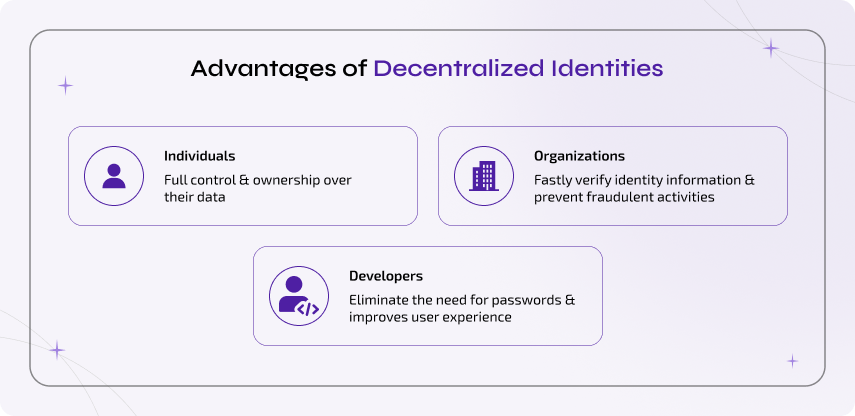

For Individuals:
The best consideration given by decentralized identities is that individuals have full control and ownership over their data. With decentralized identities, users can prove their claims and no longer need to rely on centralized agents. It also points to curbing concerns about tracking devices and data. With the help of decentralized identities, users do not have to compromise their digital identity.
Developers Side:
Developers can take advantage of the potential benefits of decentralized identities in several ways. First, it can create new opportunities to improve their user experience. Second, decentralized identities eliminate the need for passwords with seamless authentication processes. Last but not least, decentralized identities request data from secure users while addressing key requirements for data privacy.
For Organizations:
Decentralized identity helps organizations quickly verify identity information and avoid concerns about fraudulent activities such as certificate spoofing.
Download the PDF : Decentralized Identities Beginners Guide.pdf
Wrapping Up
The slogan behind decentralization is to give new opportunities to our lives and here decentralized identity does the same. Introducing decentralized identity using blockchain technology in the digital identity management process increases performance and support.
As Decentralized identity explained, it proves its worth by helping to remove concerns of third-party organizations influencing your digital identity. With the help of decentralized identities like DIDs and verifiable credentials, you can develop and hold your own digital identity.
Users and organizations no longer need to rely on third-party services for identity verification. The benefits of decentralized identities open a new decade of seamless and interoperable access to the Internet. Explore more about the implications of decentralized identity in shaping the future world.





